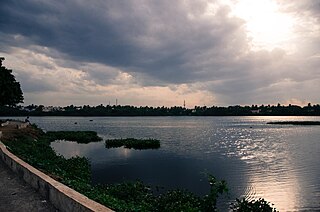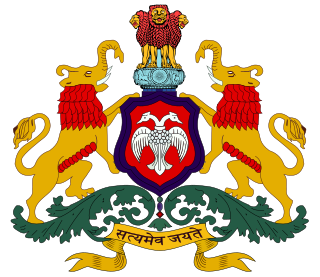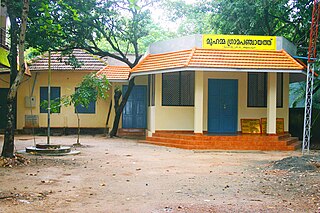Related Research Articles

Palakkad is one of the 14 districts in the Indian state of Kerala. It was carved out from the southeastern region of the former Malabar District on 1 January 1957. It is located at the central region of Kerala and is the second largest district in the state after Idukki. The city of Palakkad is the district headquarters. Palakkad is bordered on the northwest by the Malappuram district, on the southwest by the Thrissur district, on the northeast by Nilgiris district, and on the east by Coimbatore district of Tamil Nadu. The district is nicknamed "The granary of Kerala". Palakkad is the gateway to Kerala due to the presence of the Palakkad Gap, in the Western Ghats. The 2,383 m high Anginda peak, which is situated in the border of Palakkad district, Nilgiris district, and Malappuram district, in Silent Valley National Park, is the highest point of elevation in Palakkad district. Palakkad city is about 347 kilometres (216 mi) northeast of the state capital, Thiruvananthapuram.

Kanchipuram district is one of the 38 districts in the state of Tamil Nadu in India. The area comprising the present day Kancheepuram district was earlier a part of Chingleput district. The original Chingleput district was split in 1997 into form the present day Kanchiepuram and Tiruvallur districts.

Porur is a neighbourhood of Chennai, India. It is situated in the Maduravoyal taluk of Chennai district in the southern part of the city. Since 2011, it has been a part of the Chennai Corporation and included in zone number 11.
Gram Panchayat is a basic governing institution in Indian villages. It is a political institution, acting as the cabinet of a village. The Gram Sabha works as the general body of the Gram Panchayat. The members of the gram panchayat are elected directly by the people. The president of a gram panchayat is known as a "Pradhan" or "Sarpanch". There are about 250,000 gram panchayats present in India.

Elections in Kerala are regularly held to appoint government officials at various levels, both within the state of Kerala and in India as a whole. These elections encompass national elections as well as regional elections for local bodies and panchayat.

North 24 Parganas (abv. 24 PGS (N)) or sometimes North Twenty Four Parganas is a district in southern West Bengal, of eastern India. North 24 Parganas extends in the tropical zone from latitude 22° 11′ 6″ north to 23° 15′ 2″ north and from longitude 88º20' east to 89º5' east. Barasat is the district headquarters of North 24 Parganas. North 24 Parganas is West Bengal's most populous district and also (since 2014) the most populated district in the whole of India. It is the tenth-largest district in the State by area.

The Government of Karnataka, abbreviated as GoK, or simply Karnataka Government, formerly Government of Mysore, is a democratically elected state body with the governor as the ceremonial head to govern the Southwest Indian state of Karnataka. The governor who is appointed for five years appoints the chief minister and on the advice of the chief minister appoints his council of ministers. Even though the governor remains the ceremonial head of the state, the day-to-day running of the government is taken care of by the chief minister and his council of ministers in whom a great amount of legislative powers are vested.
A sarpanch, gram pradhan, mukhiya, or president is a decision-maker, elected by the village-level constitutional body of local self-government called the gram sabha in India. The sarpanch, together with other elected panchayat members, constitute gram panchayats and zilla panchayats. The sarpanch is the focal point of contact between government officers and the village community and retains power for five years. the term used to refer to the sarpanch can vary across different states of India. Here are some of the commonly used terms for sarpanch in various states: panchayat president, gram pramukh, gram pradhan, gram adhyaksha, gaon panchayat president, gram panchayat president, etc.

Panchayati raj is the system of local self-government of villages in rural India as opposed to urban and suburban municipalities.

Pappinisseri is a census town and a suburb of Kannur city in Kannur district in the Indian state of Kerala. Pappinissery have consistently won the Swaraj Trophy for best Grama Panchayat from 2017-2018 to 2021. Pappinisseri Panchayat also bagged the third position in the Swaraj Trophy during 2015-2016. Also, Pappinissery has been declared as the best Grama Panchayat in Kerala by Kerala government. Pappinisseri Panchayat comprises two villages viz Pappinisseri and Aroli. Pappinisseri better known for visha chikitsa kendram

Sreekandapuram is a municipality in Kannur district, in the Indian state of Kerala.
Local government in India is governmental jurisdiction below the level of the state. Local self-government means that residents in towns, villages and rural settlements are the people who elect local councils and their heads authorising them to solve the important issues. India is a federal republic with three spheres of government: central, state and local. The 73rd and 74th constitutional amendments give recognition and protection to local governments and in addition each state has its own local government legislation. Since 1992, local government in India takes place in two very distinct forms. Urban localities, covered in the 74th amendment to the Constitution, have Nagar Palika but derive their powers from the individual state governments, while the powers of rural localities have been formalized under the panchayati raj system, under the 73rd amendment to the Constitution.

Panchayat was a political system in Nepal that remained in place from 1961 to 1990. It banned political parties and placed all governmental power, including power over the Cabinet and Parliament, under the sole authority of the King of Nepal, effectively establishing the country an absolute monarchy.
Elections to Local Bodies in Tamil Nadu are conducted once in five years to elect the representatives to the Urban and Rural local bodies. These elections are conducted by Tamil Nadu State Election Commission

Elections in the Union Territory of Jammu and Kashmir are conducted in accordance with the Constitution of India to elect the representatives of various bodies at national, state and district levels including the 114 seat unicameral Jammu and Kashmir Legislative Assembly and the Parliament of India. The first elections in the Union Territory of Jammu and Kashmir took place between 28 November and 19 December 2020 in the form of by-elections to District Development Councils and municipal and panchayat level bodies. A fresh delimitation process for assembly constituencies began in February-March 2020.

Chengalpattu District is one of the 38 districts of Tamil Nadu, in India. The district headquarters is located at Chengalpattu. Chengalpattu district came into existence on 29 November 2019 when it was carved out of Kanchipuram district after the announcement about the bifurcation of districts on 18 July 2019.
Elections to Local bodies in Tamil Nadu were held in two phases in rural areas in the month of December 2019 viz. 27 December 2019 and 30 December 2019 for 27 districts.
Elections to local bodies in Kerala were held in two phrases, on 2 and 5 November 2015. The Left Democratic Front (LDF) won more than half of all gram panchayats and municipalities, and both they and the United Democratic Front (UDF) won majorities in seven out of fourteen district panchayats each. The LDF also won mayorship in four corporations and the UDF in two.
Elections to local bodies in Kerala were held in December 2020. Polling took place over 3 days; on 8, 10 and 14 December, with the votes counted and results announced on 16 December.
References
- ↑ "Gram Panchayat List". panchayat.gov.in. Archived from the original on 9 November 2020. Retrieved 9 November 2020.